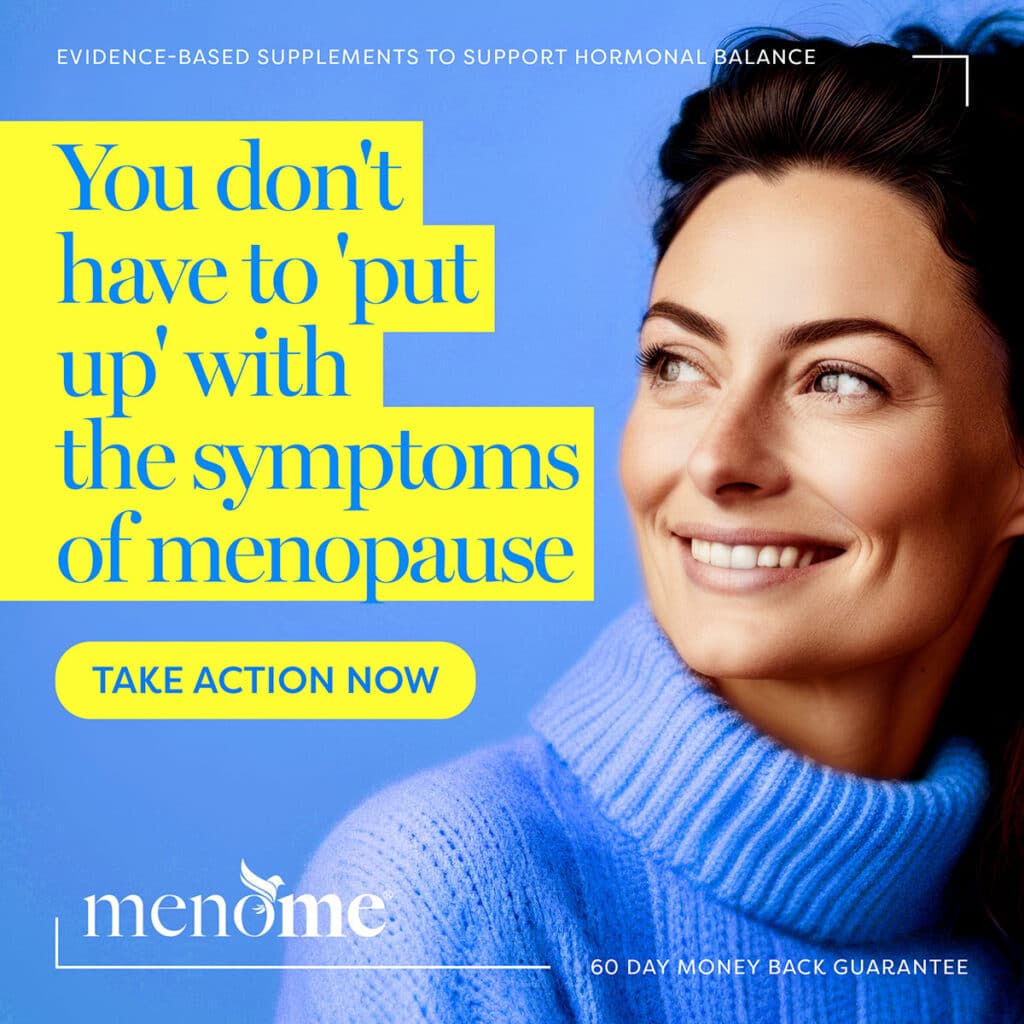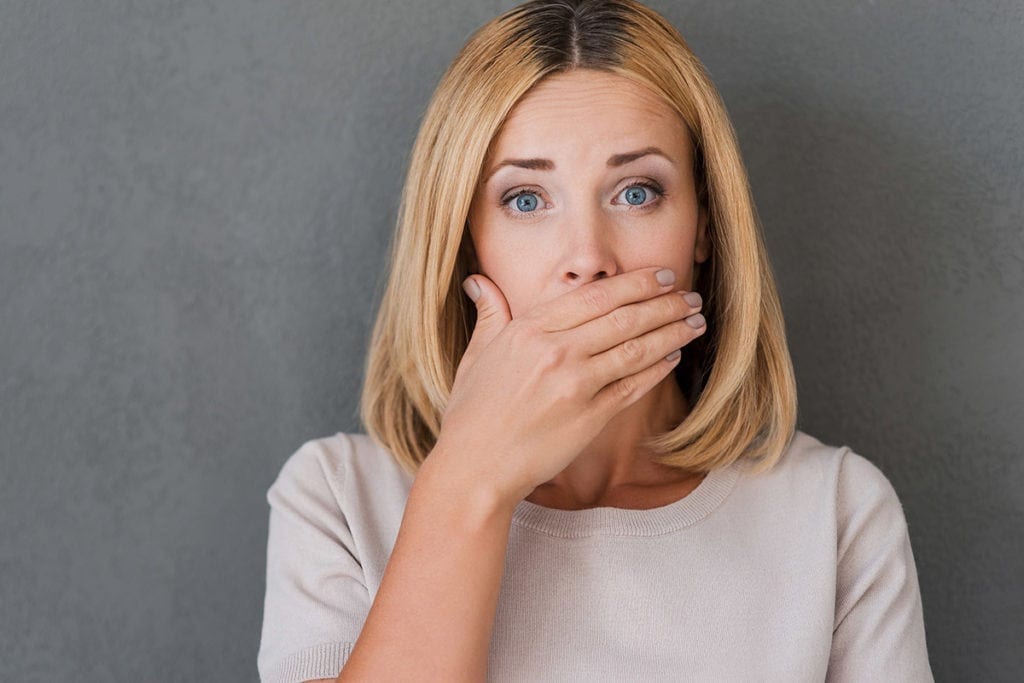Burning Mouth Syndrome (BMS) is one of the unpleasant signs of the menopausal years.
It affects around seven per cent of the population (American figure, but according to the info I can tap into it’s similar down under). The most affected members of the population are 1. women and 2. post-menopausal women though pre/perimenopausal women and males can also be affected.
Stress, anxiety, depression and recent traumatic life events put us more at risk of Burning Mouth Syndrome. As these signs often go hand in hand with the meno years. it’s not surprising that the number of women affected outnumbers men by 7:1.
Tweet Tweet: Burning Mouth Syndrome (BMS) mainly affects women who are post-menopause. Share on X
Burning Mouth Syndrome is not something I know a heck of a lot about so I put on my researcher hat and went off to get the goods from some resources I have great respect for.
The Good & The Bad of BMS
The good news is BMS is not life-threatening, the bad news is it affects quality of life. According to The American Academy of Oral Medicine (AAOM), BMS typically presents as burning on the tongue, roof of the mouth or inside surface of the lips although, in reality, BMS can occur anywhere in the mouth.
Dr Axe tells us BMS may also present as dry mouth, increased thirst, metallic taste in mouth or change/loss of taste.
The AAOM also mention that some people report a ‘draining’ or ‘crawling’ sensation in the mouth.
DermnetNZ describes BMS as:
- Oral pain – absent on waking – developing during the day, present day and night or intermittent with pain-free days
- Abnormal taste
- Dry mouth feeling
Q: What causes Burning Mouth Syndrome?
A: It’s one of those frustrating questions that no one really has an answer for. But in the case of menopause, as with most signs, it’s due to our fluctuating levels of estrogen.
The Academy of General Dentistry peer-reviewed clinical journal General Dentistry reported that it could be due to damage to the nervous system during menopause.
Perhaps underlining that finding, AAOM say it’s been suggested that the nerves in the mouth responsible for feeling pain are easily stimulated and excited.
“Contributing factors may include menopause (although we do not know why), adverse life events (loss of job, the death of family member or spouse), psychiatric disorders (such as anxiety, depression, and post-traumatic stress disorder), TMJ problems, chronic fatigue syndrome and fibromyalgia.”
Bite magazine Australia recently reported that a study had found that high levels of the herpes simplex virus type 1 (HSV-1) – cold sore virus – had been behind one woman’s BMS and that it was easily treated with antiviral meds.
Seventy per cent of the worldwide population has the virus, which can be triggered by stress and transmitted via kissing and sharing toothbrushes or towels.
It may well be worth a test if you’re suffering.
In case you’re wondering AAOM also added that in general, hormone replacement therapy is not effective in managing BMS in post-menopausal women.
Q. Is There A Cure For Burning Mouth Syndrome?
A. Right now no, though Dr Axe tells us there are loads of studies being carried out on the subject so that’s hopeful.
It’s frustrating for us that many GPs aren’t familiar with BMS or – indeed(!) – even well informed about menopause so women looking for answers often don’t find them at the doctor’s office.
It’s worth noting:
- Research shows that because Burning Mouth Syndrome has been linked with anxiety and depression lifestyle choices such as yoga, meditation, exercise and other relaxing exercises can go a long way towards helping.
- Science has shown 600mg alpha lipoic acid may also help.
- When I put out a call to our 40+ Club, the lovely Gail came back and said that she’d experienced Burning Mouth Syndrome and found that being topped up with a good multivitamin helped her.
8 Natural Tools To Try:
1. Keep hydrated
Liam Gallagher’s (Oasis) ex-wife Meg Mathews runs MegsMenopause in the UK and has experienced BMS herself. “As a society, none of us drink enough water. Two-thirds of our bodies consist of water and for women, the recommended intake is 1.6 litres a day,” she says. “The more hydrated you are, the better your oral lubrication will be. That will help to alleviate the feeling of dryness.”
2. Vitamin B12
A B12 deficiency could be behind your BMS. Your GP can prescribe a series of three B12 injections two weeks apart, and you can up your intake with supplements and B12 foods such as salmon, tuna, beef, yoghurt, feta and cottage cheese, eggs and – that vegan staple – nutritional yeast.
3. Cayenne Pepper
That rockstar Dr Axe recommends a capsaicin rinse, which is one of the principal properties in chillies. It sounds counter-productive but the proof is in the eating (so to speak!) To create your rinse, mix two teaspoons of water with one-teaspoon cayenne pepper and swish for 20-40 seconds. Hot stuff indeedy!
4. Iron
Another thing to watch out for is iron deficiency. Ensure you fill up on iron-rich foods such as spirulina, shellfish, beef, spinach, dark chocolate (yay!), quinoa, broccoli, and legumes like lentils, chickpeas, peas, soybeans and beans.
5. Zinc
One of our readers whose BMS actually prompted this story says she’s tried everything including zinc. According to the experts, as with vitamin B12, it’s important to ensure your levels are optimum because a massive part of the global population is deficient this baby. Zinc-rich foods include seeds, nuts, red meat, kefir yoghurt and – way hey hey – dark chocolate again!
6. Baking soda
Another great tip from Dr Axe is baking soda. I love baking soda! In my own experience, a doctor friend (not Dr Axe 😀) told me recent studies have shown a teaspoon in water twice a day is helpful with rheumatoid arthritis, and I use it as a brilliant all-purpose, all-natural household cleaner. Help with BMS is a new one on me, so it’s another reason to love it. It’s the inexpensive gift that keeps on giving. Dr Axe recommends mixing 1/3 cup of water with 1½ teaspoons of baking soda and gargling.
7. Honey
Just as it does with your skin and wounds, active Manuka honey swilled around your mouth is a brilliant healing and soothing agent. Any type of honey you have on hand will soothe, but its New Zealand’s famous Manuka honey that’s outdoes them all in the healing stakes.
In addition, we suggest taking aids to help support your shifting hormones such as Merry Peri® or Perky Post®.
Final Words
A few words from the Academy of General Dentistry: “avoid spicy, hot, acidic foods that can amplify signs; chew sugarless gum to increase saliva flow; and avoid tobacco and alcohol products that can cause irritation to the oral tissue.”
I do so hope this helps. Let us know if we can provide any further info for you.💜











